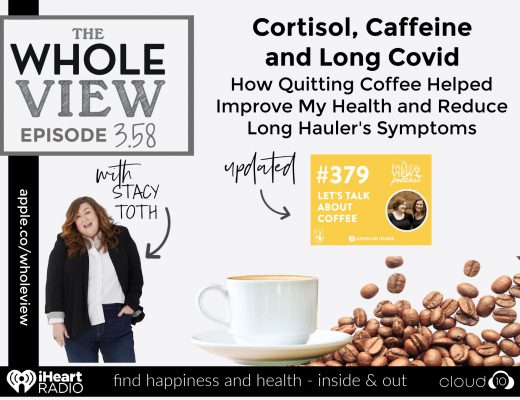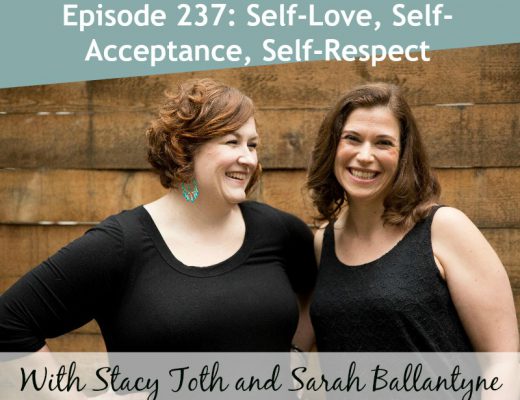Welcome to episode 497 of The Whole View! This week, Dr. Sarah and Stacy look at the science behind exercise and sedative lifestyles to determine how much and how often we need to be moving.
If you enjoy the show, please review it on iTunes!

Listener Questions
Hello Stacy and Dr. Sarah! Long time listener, first time submitting a question. Thank you both for this amazing podcast. These past few years especially, having you both there every week has been a lifesaver! My question is about exercise. This time of year it is everywhere and I’m just not feeling it. How important is exercise really to our overall health?
I love walking (and listening to both of you soapbox, of course), so I am hoping that’s enough. I just can’t see myself back in group classes just yet and I am not motivated enough to workout alone at home. Additionally, my back has been chronically sore, I assume it’s from the increased time I spend sitting, since we all have been home so much more these past 2 years. Help?! – Gabby
Key Takeaways
- Over the last decade, Stacy and Dr. Sarah have had very complex health journeys, physically, emotionally, and mentally. And getting to this place of valuing health is so important.
- Exercise is so much more than going to the gym or organizing classes. Any active moment counts towards exercise, so being away from what feels right, getting movement, and finding the joy in it. It could be the gym, or it could be chasing the dog or having a dance party with your kids.
- Getting regular moderate exercise decreases the risk of cardiovascular disease, type 2 diabetes, depression, and some cancers. The World Health Organization has even identified a lack of physical activity as the fourth leading risk factor for global mortality.
- An hour of uninterrupted sedentary time is damaging to health, so we must get up and move throughout our day. It is possible to balance an active and sedentary life, however.
- Exercise improves insulin sensitivity through action on the glucose transport molecules in the cells of our muscles. It also affects hormones related to accessing stored energy and regulating how we use it.
- When we exercise, our muscles get stronger and sometimes bigger depending on the exercise. Muscle gain is one contributor to increased metabolism. As part of long-term health, exercise (especially weight-bearing exercise) stimulates our bodies to make stronger and denser bones. Exercise is also very effective at modulating levels of the stress hormone cortisol!
- Exercise regulates several vital hormones related to circadian rhythm, so when we exercise during the day, we’ll fall asleep easier, sleep more soundly, and experience more restorative sleep.
- Exercise releases endorphins, which directly reflect several key neurotransmitters related to mood, meaning it can have a positive emotional impact on moods. Also, during regular physical exercise, inflammatory responses and stress hormones are decreased, improving immune vigilance,
- The more active you are, the greater the health benefits, provided that you are giving your body sufficient recovery time between vigorous workouts.
- Studies show significant health benefits with at least 150 minutes (2½ hours) of moderate activity or 75 minutes of vigorous exercise weekly. The intensity of your activity is relative to your individual capacity. What is vigorous for one person might be moderate for another or impossible for someone else. You can also use the “talk test” to estimate the intensity of your workout for you.
- A 2012 meta-analysis showed that regular exercise did not wipe out the harmful effects of extended sitting. That means that no matter how many buckets of sweat we lose at the gym during the week, if we spend the rest of our time sitting and not moving, we’re putting ourselves in danger.
- Studies show that EVERY bit of exercise counts! Try setting the alarm for a time or two per day to take an exercise snack break. Most people don’t start sweating until you’ve been exercising for about a minute so that you can do this in your work clothes.
- Studies show that posture might not be the problem we once thought it was. More relaxed posture while sitting shows to be more protective against future persistent neck pain.
- We don’t know how much Gabby is walking, but science would tell us that she will have significant health benefits as long as it’s at least 2.5 to 3 hours over a week. And, as we already discussed, there are additional benefits to strength training and balance activities. However, you can think outside the box.
Join Our Patreon!
Come join our Patreon family! You can support The Whole View podcast and hear what Dr. Sarah and Stacy really think about this topic in this week’s exclusive and uncensored behind-the-scenes bonus audio. We love connecting with our Patrons! It’s a direct line to submit your questions for upcoming shows, plus you also get access to some cool features like weekly bonus episodes and quarterly live video Q&As where you can ask Stacy and Dr. Sarah anything!
Products & Sponsors
- Lumineux | Amazon.com
- Find Lumineux on Amazon.com and get seven dollars off today!
- Wondrium | Wondrium.com/wholeview
- Special free 22 day trial offer!
- Just Thrive | justthrivehealth.com/discount/thewholeview
- Save 15% sitewide with promo code: THEWHOLEVIEW
Recommended Reading & Listening
- Why Exercise is Important
- Episode 47: Exercise
- Breaking The Sedentary Habit
- The Benefits of Gentle Movements
- Exercising Too Much Hurts Gut Health
- Exercise Performance & Gut Health
- Episode 132: Too Much Exercise
- Balancing Physical Activity with Rest: How Do We Get It Right?
Sources & References
- https://www.acpjournals.org/doi/10.7326/m14-1651
- https://www.ncbi.nlm.nih.gov/pmc/articles/PMC6536904/
- https://www.ncbi.nlm.nih.gov/pmc/articles/PMC3374810/
- The effect of physical activity on mortality and cardiovascular disease in 130 000 people from 17 high-income, middle-income, and low-income countries: the PURE study – The Lancet
- Sprint exercise snacks: a novel approach to increase aerobic fitness | SpringerLink
- Do stair climbing exercise “snacks” improve cardiorespiratory fitness?
- Metabolic Effect of Breaking Up Prolonged Sitting with Stair… : Medicine & Science in Sports & Exercise
- Breaking Up Prolonged Sitting
- Effect of daily 3-s maximum voluntary isometric, concentric, or eccentric contraction on elbow flexor strength
- https://bjsm.bmj.com/content/52/12/776
- https://www.ncbi.nlm.nih.gov/pmc/articles/PMC4067492/
- Stanford University study
- Study of 299 adults
- https://link.springer.com/article/10.1007/s10902-018-9976-0
- review of studies
- Another study of 15 Minutes Moderate Exercise
- Is Neck Posture Subgroup in Late Adolescence a Risk Factor for Persistent Neck Pain in Young Adults? A Prospective Study
- https://pubmed.ncbi.nlm.nih.gov/27174256/
- https://pubmed.ncbi.nlm.nih.gov/18492004/
- https://pubmed.ncbi.nlm.nih.gov/19936804/
- https://pubmed.ncbi.nlm.nih.gov/17450080/

Want more info on our Real Life? Healthy recipes, parenting tips, and general lifestyle stuff goes out in our Real Everything newsletter, join here.
Never want to miss a post, sale, or deal? Join my Healthy Inside & Out e-mail list for more info on non-toxic living and safer skincare!




